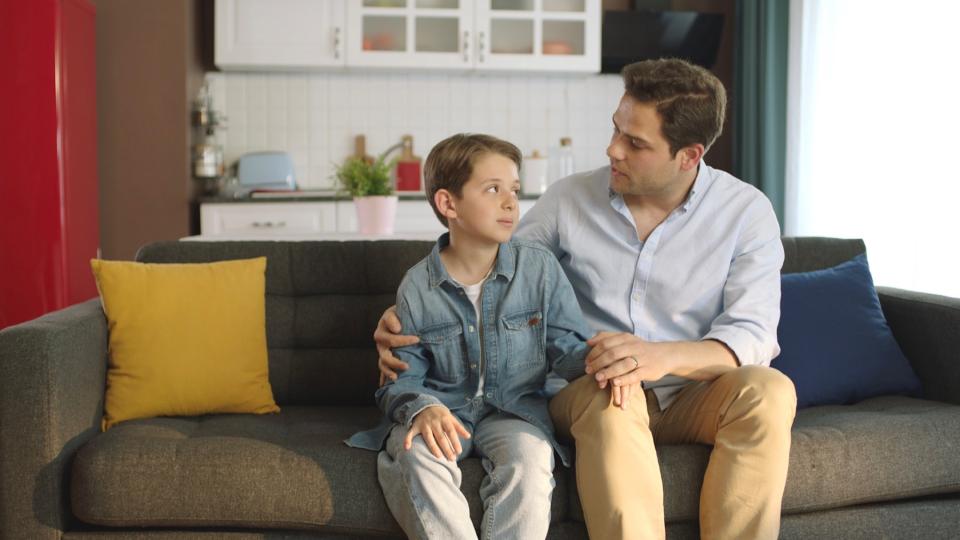How to Safely Vent About Your Co-Parent—Plus Ways to Feel Better Without Venting
Co-parenting can be incredibly stressful, and sometimes that leads to feeling overwhelmed—and sometimes that leads to a frustrated outburst, where you say something negative about your co-parent to your kids.
It’s difficult not to feel overwhelmed when you have so much to worry about. You might worry about your kids, your finances, and single-handedly keeping a household running. (Just for starters.)
The pressure weighs on you. And sometimes, you might reach the breaking point, when that stress pops out at unfortunate moments.
What does the bad kind of venting look like?
You might criticize or complain about your co-parent directly to your kids, or within their earshot (maybe when you’re on the phone with a friend), or where they can view it (like your texts if you let them use your phone, or on social media platforms). This is sometimes called “badmouthing.”
How does badmouthing hurt the kids?
Venting about your co-parent to your kids can cause damage in four major ways. But there are also concrete things you can do to avoid the wrong kind of venting, vent in healthy ways, and fix the situation if you do badmouth—plus many other ways you can decompress.

Badmouthing damages the kids’ relationships with both parents
It’s easy to see how criticizing your co-parent to your kids damages their relationship with that parent: They hear you say bad things about their parent, and they might instinctively believe (some of) it because it’s coming from a trusted source: you. Even if they’re older kids and they understand that you’re just upset, these insults can creep into their minds and take root.
Even if you have a very poor opinion of your co-parent, it’s usually healthy for the kids to have positive relationships with both parents.
But badmouthing also hurts their relationship with you. Witnessing anger can be scary for both children and teens. And when that anger comes from a trusted source and is directed at another trusted source, it can be quite confusing. The kids may come to view you as someone who tears people down.
Complaining about your co-parent sets a bad example
When kids hear their parents regularly criticize someone important in their lives, they pick up on a powerful lesson: It’s ok to say mean and angry things behind someone’s back.
Venting about your co-parent can hurt your kids’ mental health
If your children like their other parent, they may take the badmouthing personally and even internalize it. After all, half their genes come from that parent. If you call their parent lazy or stupid, they might think that they are lazy or stupid too. Or they might feel guilty for continuing to love their other parent, even though you don’t. That’s an unfair emotional burden.
High-conflict divorces cause so much stress for children that the Centers for Disease Control and Prevention (CDC) views them as Adverse Childhood Experiences (“ACEs”), which are a form of trauma. ACEs can cause significant harm to a child’s mental and physical health—throughout their whole life.
If your divorce is high conflict, a deeply protective step you can take is shielding them from negative talk about their other parent. (It also helps to shield them from negative talk between you and your co-parent—for example, by communicating through a password-protected co-parenting app, like OurFamilyWizard.)
Badmouthing your co-parent can escalate conflict—and might have legal ramifications
Your co-parent will probably end up hearing what you said about them—kids (especially little ones) are not great at keeping secrets, and it’s unfair to ask them to. That could anger or upset your co-parent, leading to greater conflict between you.
Check your co-parenting agreement to see if badmouthing is specifically addressed. Some parenting plans include a non-disparagement clause—a section that says neither parent can belittle or speak disrespectfully about the other parent, in front of the kids or others.
Comforting thought: When your kids grow up, they’ll view their other parent more clearly
If your co-parent truly is an awful person, your kids will one day recognize that—and they won’t may not be bitter towards you for forcing them to realize it sooner.

What to do if you slip and say something negative in front of the kids?
Apologize right away
It’s important for the kids to know that saying mean things in the heat of the moment isn’t a healthy coping mechanism. But it’s actually pretty easy for kids to understand feeling overwhelmed by a big emotion and doing something you regret—it’s a normal part of their daily lives.
Apologies go a long way towards lightening the moment, modelling healthy behavior, and strengthening your relationship with your kids.
Tell your kids that your anger isn’t about them
It’s easy for kids take things personally. Even if you apologize, they might feel confused, worried, or guilty. Reaffirm that you’re not mad at them and they don’t need to feel bad about what you said. Everything’s going to be ok.
Give your kids space to tell you how they feel
Since you already expressed your feelings, it can help to give your kids the opportunity to process their feelings, too. Ask them how they feel about the situation and promise to listen without judgment, guilting, or shaming.

Who to vent to about your co-parent—in a healthy way
Talk to a therapist
If you’ve been putting it off, we encourage you to give it a shot soon. Even if you’re not a therapy sort of person, you might want to make an exception. Not only is a therapist a fantastic, caring listener, but also they can help you process your emotions effectively so that you feel better after venting.
Choose an individual friend, not a mutual friend
It’s just not safe to vent to someone who is also friends with your former partner. Word might get back to your co-parent, which would increase conflict between the two of you.
So choose a personal friend who isn’t close with your co-parent. A family member, like a parent or sibling, might also be a good choice.
Choose someone with the right personality
When you’re choosing a vent buddy, look for someone who is empathetic, a good listener, trustworthy, and not too judgy. It should be someone who cares about you and can give thoughtful feedback.
(And let them have a turn venting if they need it.)
Don’t vent too much to one person
If you vent to one person too often, it hurts that relationship. They might feel overwhelmed or even feel like you’re exploiting them.
Don’t vent too much to your new partner
If you have a current partner, it’s probably tempting to vent to them. But that will make it harder for them to maintain a workable relationship with your co-parent. And if your kids overhear, it could make them resent your new partner, not their other parent.
Of course, healthy communication between you and your partner is important, and that can involve being honest about your co-parent’s actions and your feelings. But if you feel the need for a long rant, consider talking to someone else.
While we’re on the topic—your new partner shouldn’t badmouth your co-parent, either. It just muddies the waters of all the family relationships.
How to vent about your co-parent—in a healthy way
It might be unrealistic to think you’ll never complain about your co-parent, especially if there’s any conflict between you. Venting can make you feel worse, but if you do it the right way, it can be healthy to vent.
If you vent to the right people at the right time in the right way, you can let off steam without creating a problem. You might even be able to communicate with your co-parent better, since you already got this off your chest and don’t need to unload on them.
Try to stay calm, even when venting
Ideally, venting helps you feel calmer because of the emotional release it offers. But if your complaints are too heated, it can make you feel more upset. (Plus, it puts a lot of pressure on the listener.)
Keep breathing and make sure it’s a two-way conversation.
Stay open to advice, questions, and different perspectives
Getting feedback can be the difference between venting that leads to more frustration and anger versus venting that helps you reach a better state of mind and get a fresh viewpoint on the situation.
Still try to solve the problem
Sometimes, venting makes you less likely to do something about the problem. Venting is fine, but don’t let it replace action.
Not all problems are solvable, but venting shouldn’t blind you from potential solutions.

Healthier alternatives to venting
Self-care is a better way to decompress than venting. Venting is a bit of a minefield, but self-care is safe care. A journal is never going to whisper gossip to your co-parent, and meditation isn’t going to make you angrier.
Exercise
Exercise can range from an aggressive activity, like a boxing class, to relaxing movements, like hot yoga. Whatever your speed, exercise relieves stress by releasing endorphins, which are neurochemicals that make you feel happier and more relaxed. When you feel overwhelmed by pent-up anger, try going for a run or playing a game of tennis.
Spending time with friends (just to have fun)
Socializing can lift your spirits in a wholly positive way. If you feel like you have a community that enjoys your company, it can make you feel supported, give you a sense of belonging, and make you feel less lonely.
Art
Art can be therapeutic all on its own. It can relieve stress by reducing the stress hormone, cortisol, which is directly involved in venting. (It can trigger venting, and venting can raise its levels.)
Affirmations
An affirmation is a positive statement that you repeat to yourself several times, often first thing in the morning, while meditating, and/or throughout the day. Affirmations can help you reduce how often negative thoughts pop into your head. To choose an affirmation that’s truly helpful, acknowledge the difficulty you’re facing, but counterbalance that with the positive way you’re going to respond to it.
Meditation
Meditation can reduce stress, anxiety, blood pressure, and even PTSD. There are many articles about how to meditate (here’s one). Even if it doesn’t seem like your kind of thing, consider giving it a try because of its scientifically proven benefits.
Venting: It’s useful if you do it right, but it’s not your only option
It’s normal, of course, to want to vent. If you vent to the right people at the right times, it may be easier to avoid venting to the wrong people (your kids) or at the wrong times.
But venting isn’t the only way to reduce painful emotions. Try one of the methods listed above and see how it compares to your previous venting sessions.



